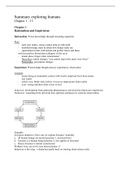Summary exploring humans
Chapter 1 - 13
Chapter 1
Rationalism and Empiricism
Rationalism à true knowledge through reasoning capacities
Plato
- each own reality, senses cannot help us with truth
- truth/knowledge must be about how things really are
- supernatural realm with eternal and perfect forms and ideas
with less perfect forms/ideas (allegory of the cave)
- innate ideas, forgot when reincarnated
Heraclitus: reality changes “you cannot step in the same river twice”
Parmenides: perception changes
Empiricism à knowledge though sensory experiences, observation
Aristotle
- senses bring us immediate contact with world, empirical facts from nature
- one world
- tabula rasa: blank slate, before it receives impressions from reality
- nous: strong intuition what is true or real
Induction: development from particular phenomena to universal law (hard-core empiricist)
Deduction: reasoning from universal laws (primary premises) to concrete observations
Example:
Syllogism deductive: How can we explain Socrates’ mortality
a. all human beings are mortal (premise 1, universal law)
b. Socrates is a human being (premise 2, law applies to Socrates)
c. Hence Socrates is mortal (conclusion)
Problem: how can we be sure about premise 1?
Induction is first step ® deduction (pulls back on trusting observations only)
,
, Chapter 2
Scientific revolution
Middle ages:
- Roman Catholic Church dominant force social, political, intellectual, religious
- Aristotelian cosmos (Aristotle, Ptolemy) geocentric view, two realms superlunary,
terrestrial everything eternal and perfect
o Thomas Aquinas made it fit with Christian theology
o Copernicus: earth orbits around sun à clash authority and observation
Early 17th century
- Francis bacon outlined new scientific method
o science should be based on observation and experiment. Not rely faith,
theology, tradition
- Scientific Revolution, guided by observation and experiment Characteristics:
- Commitment to observation and experiments
- Application of universal mechanics
o Universe as a clockwork rather than an anthropomorphic or animated entity
- Application of universal mathematics
o For detailed description (and prediction!) of the regular mechanical principles
(laws, forces)
Francis Bacon (empiricist)
- Finding truth requires observation, do not trust only in human perception:
o 4 Idols of the mind (“pitfalls” of the human mind)
1. idols of the tribe: as humans, our senses can deceive us and make us jump
to conclusions that we cherish uncritically
2. idols of the cave: as individuals, our character may predispose us to eagerly
embrace either tradition or novelty
3. idols of the marketplace: We use lots of words that do not refer to reality
4. idols of the theatre: We may be caught up in old dogmas and methods of
thought
- Less tabula rasa than ‘pure’ empiricism, we should be thoroughly freed and cleansed
for decent science
Chapter 3
Modern rationalism and empiricism
Enlightenment
– striving positive knowledge
– think for oneself, use criticizing reason reject authority
Descartes
- senses are not to be trusted
- foundation of knowledge should lie in absolutely certain statements
- Knowledge should be obtained by reason because senses can deceive us (even
geometry)
- The only true certainty: he was doubting and thinking, “I think and therefore I am”
- some ideas are so clear and distinct, must be true





